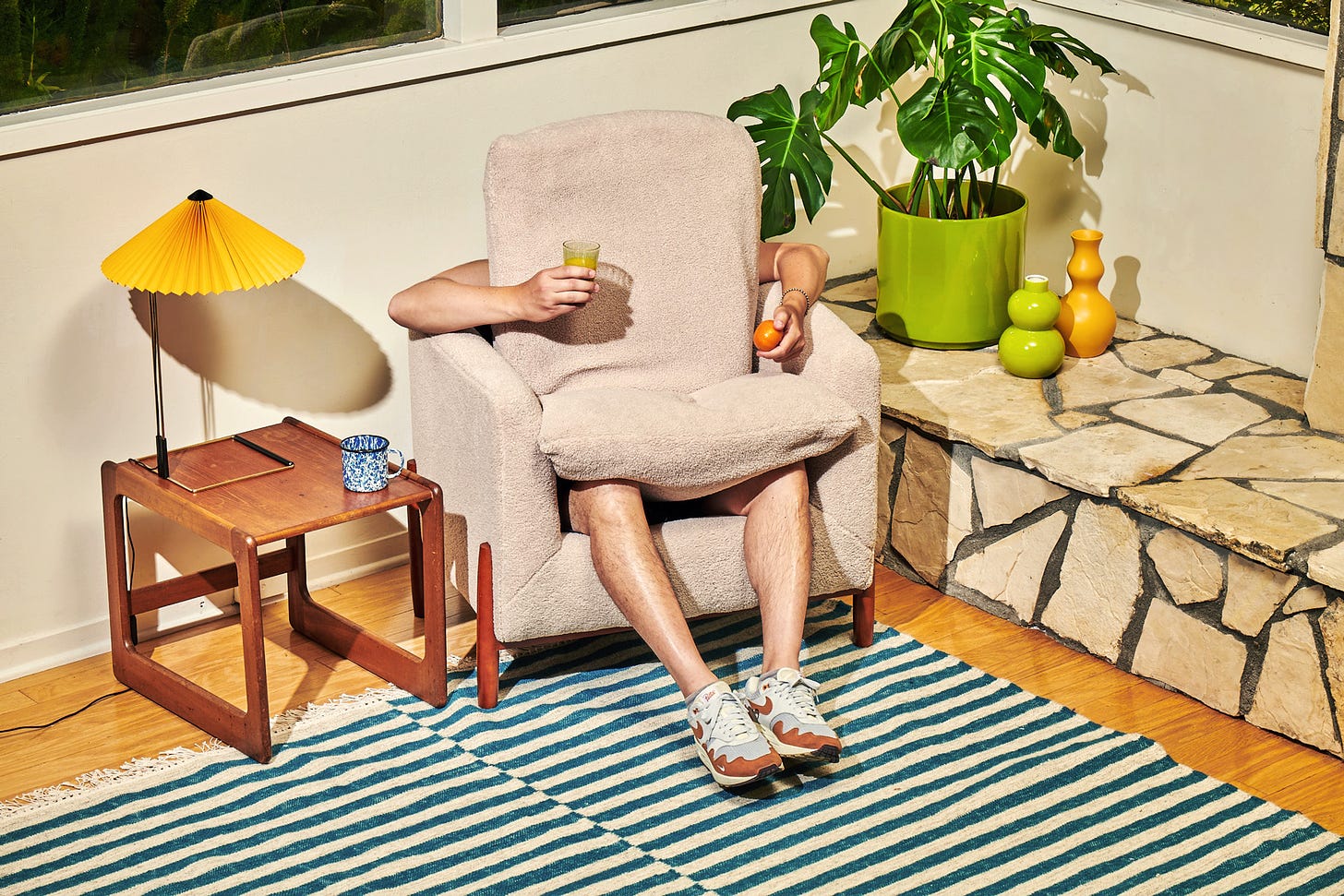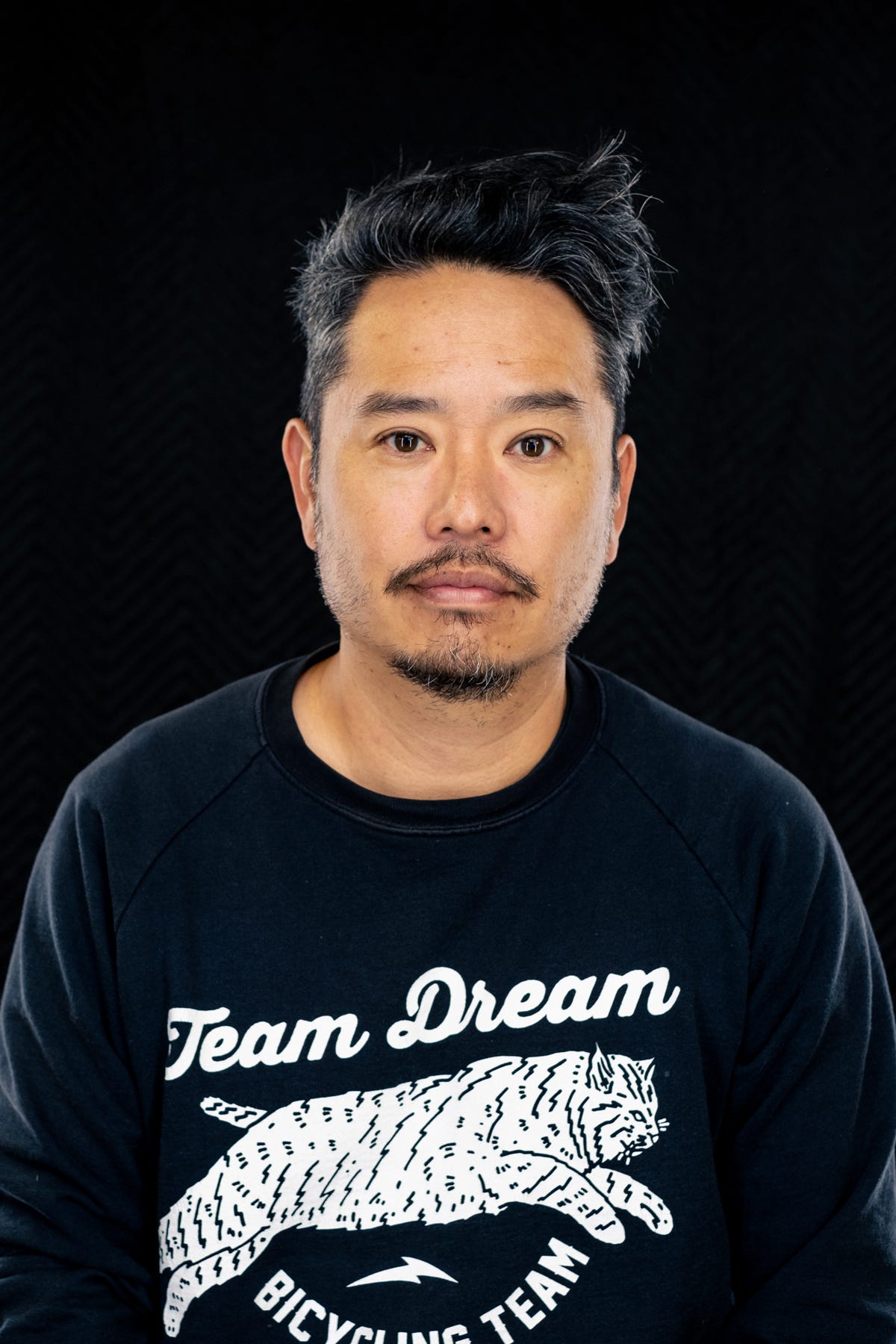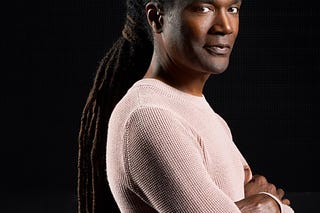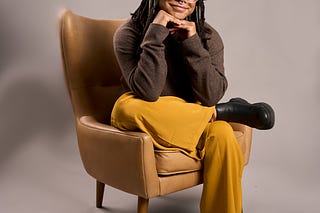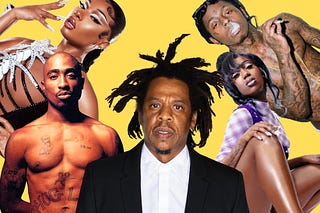A Long Ass Conversation with David Kim, Executive Creative Director at Postmates
Choreographer. Interactive designer. Father. He's done it all.
There are some Zoom calls that require your chin to be up and a fake smile plastered across your face for 45 minutes. And then there’s talking to David Kim, which feels like passing a joint back and forth while watching Beetlejuice.
He’s an Executive Creative Director at Postmates who doesn’t spend an entire interview waxing poetic about what makes him spectacular — he’ll tell you why Beetlejuice is his favorite movie instead. Or how calling in sick to work really meant him working on choreography for a famous music group — but I’d rather you just read about it in the interview, instead of me spilling the deets here.
Kim grew up a movie fanatic, and planned to be a professor. Somewhere along the way, he fell in love with the idea of making cool shit. Starting off as a designer at Interscope Records, he hopped into the world of advertising at TBWA Chiat/Day as an art director after two years.
Within three years, he was an Interactive Creative Director at Publicis, making use of his design skills to climb the corporate ladder quickly. “When I was at Chiat, there was a period when if you knew interactive or if you knew the web at all, you could parlay that into a promotion pretty quickly,” he says during our call. “No one understood it. And so I seized those opportunities.”
It’s clear that since he’s now an ECD that Kim’s vaulted to the top of that ladder. He’s led a creative studio (Netflix), grew creative teams (Argonaut), and made a pandemic Don’t Cookbook (Postmates) — and he’s still going hard for what matters to him the most in the industry: having fun. “It's been super fucking fun,” he says about the journey. “So for me, it's like the job I have now is cool for me because I get to do and talk about stuff that's important to me.”
Here’s a long ass career-spanning conversation with Kim that covers movies, developing creatives, and more.
This interview has been lightly edited and condensed for clarity.
So my first question for you is, what was David like as a kid?
I was born in the seventies, so I grew up as an eighties kid in the suburbs of Los Angeles. Pretty quiet, overall pretty nerdy, and academic achievement was important to me . Asian immigrant kid, which meant, “you have to be a doctor or lawyer.” Up until a certain point in my life, I was just a professional student who only aimed to get good grades and get through high school and college.
But amidst all that, I took on a lot of the classic suburban angst and rebellion motifs from listening to depressing music like Depeche Mode — and then I got introduced to punk rock and hiphop.
I was raised on movies, which were huge to me because I had a fairly sheltered life at that point. All the great seventies directors like Francis Coppola, Martin Scorsese, and Brian DePalma, I watched. I was always actively looking for other films from a very young age.
By the time I got to high school, I was already watching a ton of foreign films, and I think that seeped into my brain as I started to look at things in new creative directions.
What movie do you think has had the most impact on you?
There are so many. Beetlejuice is one, because I loved this wild world that Tim Burton came up with. I think Michael Keaton's performance should be on the list of the top 10 performances of all time. He's an incredibly gifted comic actor. But then on the other hand, I watched a lot of Scorsese films. I ended up writing my undergrad thesis on him.
So my absolute favorite film of all time is Raging Bull because it proved to me how artful you can be. Every shot is so beautiful and composed. The artistry in that film is at such a high level, but it's also extremely personal storytelling. It's very specific about growing up Italian American and immigrant culture within New York City, and it spoke to me that you could be personal while also connecting with a large audience.
What’s your advertising story? I saw that you started as a designer for a record label and then made the transition to becoming an art director. What was that transition like? What inspired you to make the jump?
It all started in the 2000s. Remember when I said that I was a lifelong student? I planned on being a professor. Originally, I was at UCLA for graduate school, studying film, TV, and culture studies. I was on track to teach film theory.
While I was there, my curriculum had a production requirement, which most people doing something similar chose screenwriting. Instead, I decided to learn web design and animation. I studied a lot of Flash software and started building games/interactive experiences that helped establish me as an interactive designer.
I pitched my skills to Interscope and showed them a DJ mixing game that I constructed. They wanted to know if they could repurpose it for the Black Eyed Peas. So something that was literally a portfolio piece just turned into a commercial project immediately, which they paid me for.
After that, they put me on retainer as an all around creative guy. I got to work with some of my favorite artists of the time. And after a point, I was able to package that portfolio and present it to Chiat Day and become an art director. When I started,I was on the Playstation account for my first year there. When I left, I was on the Nissan and Infiniti accounts.
Let’s bring it back to Interscope for a second. What was your favorite project to work on?
I grew very close to Gwen Stefani and No Doubt. My boss was very good friends with their manager. For me, it was very, very good exposure at a pretty young age to big celebrity artists. I got to see how they operated within the studio and maneuvered when they’re out in the world, you know? I worked heavily on their last album.
This is a fun little weird factoid: I directed and choreographed No Doubt’s last live televised performance. It was for the Billboard Music Awards. I was actually working at Chiat as an art director at the time, and I was like, this is literally, I've never told anyone this, calling in sick to get it done. For about a week, I was “sick” but actually in studios working on this final performance. I was, literally, telling Gwen how to dance and where to hit her marks on stage. It was so complicated.
This thing that we wanted to do was half animation, half live performance, kind of like the Gorillaz at the time, who were a big influence on her. So she wanted to do a stage performance where you had an animated version of her on these three screens and the animated version of her would only appear when she walked behind the screen. So she had to choreograph her movement to the timing of when the animation appeared.
It was so fucking hard that it literally drove her to tears. And I'm not a choreographer dude. Like, I had no idea how to direct a stage show. But I found myself with this opportunity and I accepted the challenge.
Your career trajectory is so interesting. You have this relatively short period as an art director before making it up to the senior level. What was the process like for you to elevate so quickly? What type of skills did you have for that to happen?
You have a good eye, dude. I should have stayed an art director much longer. When I was at Chiat, there was a period when if you knew interactive or if you knew the web at all, you could parlay that into a promotion pretty quickly. No one understood it. And so I seized those opportunities. I wanted to climb the ladder. I had the normal career ambitions a lot of folks have, and I was like, oh yeah, I'll take the ACD job, you know, I'll take that CD job.
I did those things having no understanding of what a creative director or a leader or a manager really needed to do. I didn't pick those things up until much later. I was a pretty crappy creative director I think for, for many years. I think what really turned me around was becoming a dad.
Like, once I had a kid, I just had a much better understanding of prioritizing somebody else, you know, because that's the biggest thing. As a creative director, you should want people to succeed, and your reward is watching the team succeed. That took a lot of time for me to figure out.
From your perspective, how much of success in advertising do you think comes from your intrinsic potential versus your development as a creative at agencies?
Classic sort of nature versus nurture. I think it's really, really hard to say. I'm sure it's a blend of both, you know? But I think you have to have a natural sort of personal inclination to want to make interesting artful things.
For some people, it seems like they have that as a natural gift. There are some writers where, if you give them any brief, they knock out a ton of scripts — and they’re all hilarious. And you're like, God, how does someone do that? I used to always look at people like that and go, “I don't have that.”
But then as I just did it more, I could start to do that. I could start to generate ideas at volume. Anyone can write pretty good scripts or come up with concepts. It was no longer that impressive to me. What was becoming more important was seeing a unique personal vision and voice.
I think understanding who you are as a creative person is absolutely the blending of nature and nurture. It’s this innate thing in you, but then it's all the experiences you've had that kind of inform how you see the world and the kind of work that you want to make.
I wanted to ask you about your time at Argonaut. Developing cool concepts for an established agency is one thing, but being in the position to help grow an agency from such a small amount of employees to a bigger group of people takes another skill entirely. How does something like that help shape and grow you as a creative?
You can only really grow if you're winning business and doing the business side of things better. At Argonaut, I worked on the biggest client there, which was Cricket Wireless. And when you are bringing in that much revenue, you have to staff for it. And so that's really how our agency grew. I think at the time we had some cachet. We had done a Super Bowl spot for Volkswagen. There was a lot of energy around the agency, you know, especially in its first two and three years.
It was cool to be a part of all that. When it’s that small, everyone's working on every brief. You know, there's just a lot of comradery, and the trick is how to scale that as the agency grows. The way I like to work is to have other talented people around me, you know, where we can all support each other.
I received some advice from this fucking brilliant Senior Art director named Luis Pena. He told me, you know, no matter where you are, all you need to do is find your five or six people. You could be at a shitty giant agency working on banner ads, but if you find five or six people that think they want to make great work, you’ll gravitate towards them and work on projects together. Once I figured that out, I was like, okay, I could, I can go like succeed anywhere — and I brought that to Argonaut.
When you’re recruiting creatives or at least admiring their work, what qualities do you look for?
I think overall I like the folks with work that’s really fucking unexpected. I can't tell you how many portfolios I see that seem to just go, “I'm another cog in the machine. I know how to design using the most trendy fonts and styles. I’m funny, can’t you see?” And then the jokes are, like, bottom of the barrel.
It's hard to pinpoint like what really catches my eye, but it's usually kind of fucked up, and surprising. But then if they can also hit me with the feels, that sincerity, some seriousness, weight, I’m floored. Like this is my person. They reflect the full human experience — from silliness to seriousness.
What makes you most excited about this job, like this industry in 2023?
I don't know if I am excited about the industry as a whole, right? I think I have healthy reservations about what we do as a business that's informed by the fucking capitalism of it all, you know? Let me get personal. The thing I like about the job I have now is that I get to talk about food and culture. I just like being able to do cultural campaigns with food at the center.
It's been super fucking fun. So for me, it's like the job I have now is cool for me because I get to do and talk about stuff that's important to me. Jumping back to the industry as a whole, I think right now there, there's a couple observations for me.
One is I don't think the work is very good. I don't see a lot of work out there that inspires me. And it's a bummer because when I first got into the business, working on PlayStation and seeing early Apple ads I was in love with the idea of making artful things and getting paid.
And now I think creative talent is so dispersed. The briefs and the ad assignments are not particularly rewarding or yield great results. As a result, I think there's just less sexiness and gravitational pull around the ad industry right now.
What do you think is the reason for that? So much has changed — from technology to culture itself over the years.
You can only do great work if you have talented people there, you know? I think talent is drawn right now to other opportunities outside of advertising, right? Tech, for instance, is pulling tons of people.
Although there's been a ton of layoffs recently, tech is still huge — and will continue to be. It’s a much sexier industry. So you're just naturally pulling in the brightest, most talented people there.
Speaking of tech, I’ve gotta ask. What’s your take on AI and creativity?
God, I wish I could come up with a short quippy version for you. I do think that AI and robots will be the demise of humanity. It's freaky. And I think the problem with it is that it’s going to get exponentially smarter at a pace that we can't even fathom. And I think on top of that, it's very hard to police.
There is always going to be a tiny percentage of people that will benefit from whatever havoc that AI reeks. But I think a lot of what I read sounds so sci-fi, but I do think it's true. It's just like, do we want things to be more human? Or do we want things to be more artificial? It's very simple, if you look at it in those two terms.







